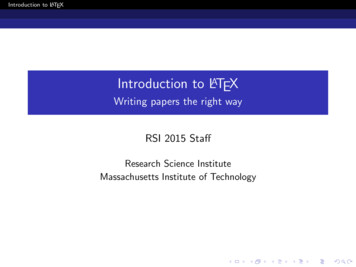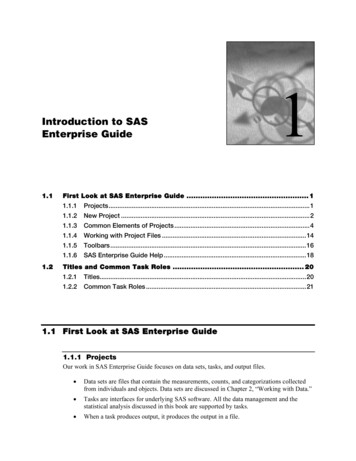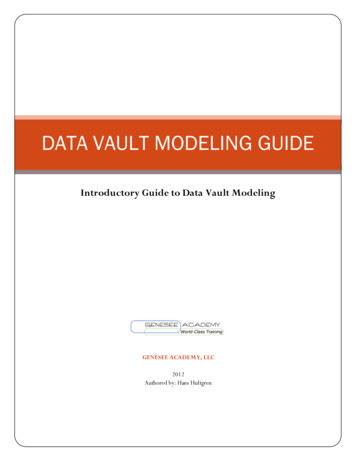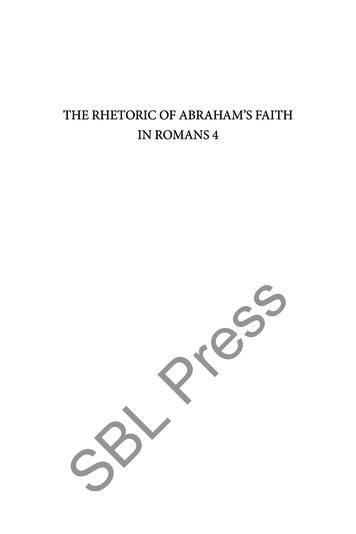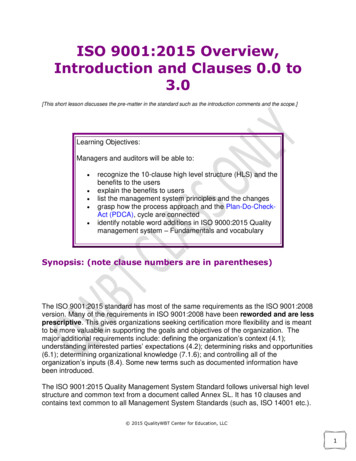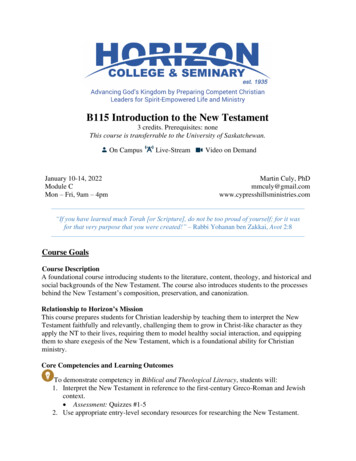
Transcription
B115 Introduction to the New Testament3 credits. Prerequisites: noneThis course is transferrable to the University of Saskatchewan.On CampusLive-StreamJanuary 10-14, 2022Module CMon – Fri, 9am – 4pmVideo on DemandMartin Culy, ��If you have learned much Torah [or Scripture], do not be too proud of yourself; for it wasfor that very purpose that you were created!” – Rabbi Yohanan ben Zakkai, Avot 2:8Course GoalsCourse DescriptionA foundational course introducing students to the literature, content, theology, and historical andsocial backgrounds of the New Testament. The course also introduces students to the processesbehind the New Testament’s composition, preservation, and canonization.Relationship to Horizon’s MissionThis course prepares students for Christian leadership by teaching them to interpret the NewTestament faithfully and relevantly, challenging them to grow in Christ-like character as theyapply the NT to their lives, requiring them to model healthy social interaction, and equippingthem to share exegesis of the New Testament, which is a foundational ability for Christianministry.Core Competencies and Learning OutcomesTo demonstrate competency in Biblical and Theological Literacy, students will:1. Interpret the New Testament in reference to the first-century Greco-Roman and Jewishcontext. Assessment: Quizzes #1-52. Use appropriate entry-level secondary resources for researching the New Testament.
B115 Intro to NT (Winter 2022), 2 Assessment: Research and Reflection Paper3. Identify and explain key terms and ideas in New Testament studies. Assessment: Quizzes #1-5, Reading and Analysis, Research and Reflection Paper4. Apply New Testament teachings to contemporary issues. Assessment: Research and Reflection PaperAbout the InstructorMarty Culy is the Director of Cypress Hills Ministries. He has been a follower of Jesus since1974 and has been blessed to serve the Lord as a Bible translator, college and seminaryprofessor, pastor, and church planter over the past 35 years. He has been married to his wife, JoAnna, since 1985, and they have three adult children who are all followers of Jesus (and eightgrandchildren). Marty is the founding editor of the Baylor Handbook on the Greek NewTestament commentary series and is the author of many articles and twelve books, including TheBook of Revelation: The Rest of the Story (2017), Quoting Corinthians: Identifying Slogans andQuotations in 1 Corinthians (2018), and The Fear of the Lord is the Beginning of Everything(2021).Course WorkRequired ReadingsBerding, Kenneth and Matt Williams. What the New Testament Authors Really Cared About: ASurvey of Their Writings. Second Edition. Grand Rapids: Kregel Academic, 2015. (ISBN9780825443848)Watson, Edward W., and Martin M. Culy. The Making of a Disciple: Character Studies in theGospel of John. Eugene, OR: Cascade, 2021. (ISBN: 9781725298767)**While students have the benefit of accessing their textbooks online through the DigitalTheological Library, they will not have access to the Digital Theological Library upongraduation. Therefore, we encourage students to purchase select textbooks to build their personallibrary. For your convenience, Horizon has partnered with Kennedy’s Parable to providetextbooks.Course Assignments and ActivitiesPortfolio Components. Research and Reflection Paper. This assignment must be editedand submitted to the Biblical and Theological Literacy e-Project in your Portfolio on Portfolium.See the Portfolio Guide: “What Goes in My Portfolio” for further information.BEFORE THE MODULEPreparing for the Week of Class: This assignment will help you begin to develop a frameworkfor interpreting the New Testament in reference to its first-century Greco-Roman and Jewishcontext and begin to identify and explain key terms and ideas in New Testament studies (seeLearning Outcomes #1 and #3).
B115 Intro to NT (Winter 2022), 31. Quiz #1.There are 3 elements required to prepare for Quiz #1. Bible Reading. Read the Gospel of John carefully. Watch for key features (content) ofJohn’s Gospel and themes that are particularly prominent (usually because they occurrepeatedly). Part of your grade for Quiz #1 will be based on confirming that youcompleted this reading assignment. This assignment provides a foundation for classdiscussions of appropriate reading strategies and how to identify key themes in theNew Testament (see Learning Outcome #3).Textbook Reading: What the New Testament Authors Really Cared About. Carefullyread Chapter 1 (pages 17–35), Chapter 3 (pages 62–79), and Chapter 26 (pages 315–320)of Berding/Williams. Come to class on January 10 prepared to answer quiz questionsfrom Quiz #1 covering the material in these chapters. This assignment is intended to helpyou begin to understand key background issues (see Learning Outcome #1) andunderstand key themes and ideas in the Gospel of Mark (see Learning Outcome #3).Textbook Reading: The Making of a Disciple. Be sure to complete the Bible Readingsection of this assignment before doing this part. Carefully read Chapters 1–4 (pages1–52) of Watson/Culy in preparation for Quiz #1 on the first day of class. Thisassignment introduces you to foundational reading strategies for biblical narratives(see Learning Outcome #1) and models how to identify key themes in NewTestament (and other) narratives (see Learning Outcome #3). Pay close attention tohow we get meaning from characters in biblical narrative and how this is illustrated inthe characters that are discussed in the assigned chapters in preparation for Quiz #1.Related learning outcomes: #1 and #3.Due date: January 10, 2022.DURING THE MODULE (January 10-14, 2022)2. Quizzes #2-#5.There will be quizzes given each day at the beginning of class. Each quiz will primarily be usedto assess your growing ability to explain key terms and ideas in New Testament studies (seeLearning Outcome #3), though there will also be some questions that are used to assess yourgrowing ability to interpret the New Testament in reference to its first-century Greco-Roman andJewish context (see Learning Outcome #1). Each quiz will mostly be made up of multiplechoice questions, with some TRUE/FALSE questions, and some that require you to fill in theblank.Quizzes #2-5 will cover (1) the material from the textbooks listed in the course schedule for thatday and (2) key points from the previous day of class. Students may optionally do some or all ofthe textbook readings that relate to these Quizzes 2-5 prior to the week of class. Assessmentsbased on Quizzes #1-5 will consider how you have demonstrated competency through all of thequizzes together for both Learning Outcome #1 and #3, rather than through each individual quiz. Related learning outcome(s): #1 and #3. Assignment Length: N/A. Due date: January 11-14, 2022 (daily).
B115 Intro to NT (Winter 2022), 4AFTER THE MODULE (January 15 – February 11, 2022)3. Reading and Analysis.Read through the New Testament books listed in the Reading Chart at the end of the syllabus(50% of the chapters found in the New Testament). You are free to complete the reading bylistening to audio recordings of the New Testament, or through a mix of reading and listening.You will need to submit your reading chart along with either Option #1 or Option #2. For thisassignment and the final assignment, choose ONE of the following options:a. OPTION #1: As you read, make a running list of passages that speak to one of thekey components of a Christian worldview we discussed in class. Copy and pastethe full passages (not just references) into a document and submit it along withthe completed Reading Chart. You will need to frequently pause or stop readingto add to your running list. This assignment assesses your growing ability to readScripture (primary source material) carefully with a view to identifying keythemes (see Learning Outcome #3). Please be sure to review Assignment #4below before starting on this assignment. Related learning outcome: #3. Assignment Length: No limit. Due date: February 2, 2022.b. OPTION #2: As you read the Gospel of Luke and Acts (part of the readingassignment), identify at least two characters that you think would be suitable for acharacter study. Write a brief paragraph for each character explaining what makesthem suitable for a character study in light of what you have learned in thetextbook (see Learning Outcome #3). Please be sure to review Assignment #4below before starting on this assignment. Related learning outcome: #3. Assignment Length: 1-2 pages. Due date: February 2, 20224. Research and Reflection Paper.Using your Bible and credible scholarly sources, you will research and produce a report on anapproved topic of your choice following one of the two options below. Both options for theresearch and reflection paper give you an opportunity to demonstrate your growing ability toselect an appropriate research topic, identify and evaluate primary and secondary sourceinformation, identify and explain key issues within the topic, and communicate how the Biblerelates to contemporary issues (see Learning Outcomes #2, #3, and #4). If you chose Option #1for the Reading and Analysis assignment, you must choose Option #1 for this assignment.Similarly, if you chose Option #2 for the Reading and Analysis assignment, you must chooseOption #2 for this assignment.a. OPTION #1: We will discuss a variety of key components of a Christian worldviewduring the week of class. You may choose one of these or seek approval for analternative topic. Once you have your topic, you should begin by making a runninglist of biblical passages that relate to the topic as you read the assigned books of the
B115 Intro to NT (Winter 2022), 5New Testament (see Option #1 in Reading and Analysis assignment above). Youshould then proceed to review appropriate secondary resources. For this option, youmust use at least three scholarly sources, including at least two books and onescholarly article, essay, blog post, or Bible dictionary/encyclopedia entry. Yoursecondary research will point you to additional New Testament passages that arerelevant and also help you to flesh out the significance of the biblical data for yourtopic, but this option relies more heavily on primary research (examining the NewTestament itself). In the final portion of your paper, be sure to identify how this topicrelates to contemporary issues.b. OPTION #2: Choose a character or character pair from the Gospel of Luke or Acts tostudy (see Option #2 in Reading and Analysis assignment above). Once you haveyour topic, you should begin by carefully identifying the lessons taught through thecharacter(s). Your paper should follow the same pattern found in the character studiesof The Making of a Disciple. First, carefully describe the details of the passage,focusing on the actions of the character(s) you are examining. Second, identifylessons in discipleship that are taught through the character(s). Third, conclude with“questions for disciples” that will demonstrate how you would help others to connectthe discipleship lessons to their lives. Early on in your paper, you should include abrief discussion of how we get meaning from characters in narrative texts. Feel free tomake heavy use of Chapter 1 in The Making of a Disciple as a scholarly source forthis portion of your paper.I recommend that you complete a rough draft of your paper and then consultsecondary sources and add further insights from them to complete your paper. Forthis option, you must use at least five scholarly sources. Your sources will likelyprimarily be scholarly commentaries, but in some cases other sources that relate tospecific character studies may be available, such as the following:Black, C. Clifton. “The Presentation of John Mark in the Acts of the Apostles.”Perspectives in Religious Studies 20 (1993): 235–54. (Available onlinethrough Horizon Library)Darr, John A. On Character Building: The Reader and the Rhetoric ofCharacterization in Luke–Acts. Louisville: Westminster John Knox, 1992.Lehtipuu, Outi. “Characterization and Persuasion: The Rich Man and the PoorMan in Luke 16:19-31.” Pages 73–105 in Characterization in theGospels: Reconceiving Narrative Criticism. Edited by David Rhoads andKari Syreeni. Journal for the Study of the New Testament SupplementSeries 184. Sheffield: Sheffield Academic, 1999.Whichever OPTION you choose for Assignment #4, be sure to construct your paperaccording to the Horizon Format Guide. **Remember, this paper will be a part of yourLearning Portfolio and will allow you to prove achievement of the learning outcomes. Related Learning Outcomes: #2, #3, #4.Assignment Length: 5-7 pages.
B115 Intro to NT (Winter 2022), 6 Due date: February 11, 2022.Video-on-Demand (VOD) Student RequirementsAs indicated on the course schedule, this class is being offered by VOD. Students who intend totake the course primarily through VOD are required to indicate this during their courseregistration. While VOD recordings are available for any student who may miss a class, nonVOD students are expected to attend class live following the class attendance policy. For this course, VOD students have different assignment due dates as in-class students.The assignments are due as below:o Quiz #1: due January 17 at 11:59PM (complete before watching the lectures)o Quiz #2: due January 22 at 11:59PM (complete before watching the lectures)o Quiz #3: due January 27 at 11:59PM (complete before watching the lectures)o Quiz #4: due February 1 at 11:59PM (complete before watching the lectures)o Quiz #5: due February 5 at 11:59PM (complete before watching the lectures)o Reading and Analysis: due February 10 at 11:59PMo Research and Reflection Paper: due February 17 at 11:59PM VOD students are required to watch and engage with all lecture content and in-classactivities from one full day of the module, according to the schedule below.o Day 1 lectures & FlipGrid report: completed by January 17 at 11:59PM.o Day 2 lectures & FlipGrid report: completed by January 22 at 11:59PM.o Day 3 lectures & FlipGrid report: completed by January 27 at 11:59PM.o Day 4 lectures & FlipGrid report: completed by February 1 at 11:59PM.o Day 5 lectures & FlipGrid report: completed by February 5 at 11:59PM. According to the schedule directly above, VOD students will submit a 2–3-minute videoto FlipGrid that 1) affirms you have watched the required recording for the last sevendays, 2) summarizes one thing you learned that week that will help you reach the courselearning outcomes, and 3) explains at least one question you had after watching the classrecording. In order to pass the course, VOD students must submit all of their VOD weeklysubmissions. These submissions are marked are pass/fail based on whether or not theydemonstrate thoughtful engagement with the lecture content and in-class activities.Estimate of Time Investment (individual time investments may vary)Classroom time30 hrsN/A1. Quiz #19 hrsJanuary 102. Quizzes #2-56 hrsJanuary 11-143. Reading and Analysis16 hrsFebruary 24. Research and Reflection Paper25 hrsFebruary 11Total 86 hrsAssessment RubricsRubrics for your written assignments will be available on Populi by the first day of class underthe Lesson “B115 Assessment Rubrics.”
B115 Intro to NT (Winter 2022), 7Course Outline / Class SchedulePlease take time on the first day of class time to enter assignments into a study calendar.DateMonday, Jan 10TopicsIntroduction to the NTThe “Synoptic Problem”Gospel of Matthew, Mark, LukeTuesday, Jan 11Gospel of JohnActs of the ApostlesIntro to Pauline Epistles, RomansWednesday, Jan 121 & 2 CorinthiansGalatians, EphesiansPhilippians, ColossiansPM: Library Orientation1 & 2 Thessalonians1 & 2 Timothy, TitusPhilemon, Hebrews, JamesThursday, Jan 13Chapel 10:50am –12:20pmFriday, Jan 141 & 2 Peter, Jude1, 2, 3 John, RevelationJan 15 – Feb 11Working on Post-ModuleassignmentsRevision WeekFeb 21-25 First submissions of assignments will not be accepted after February 18, 2022.Monday, February 21, 2022Tuesday, February 22, 2022Wednesday, February 23, 2022Thursday, February 24, 2022Friday, February 25, 2022 Readings/QuizzesQuiz 11. Gospel of John2. Watson/Culy, pp. 1–523. Berding/Williams, pp. 17–35,62–79, 315–320Quiz 21. Day 1 class material2. Watson/Culy, pp. 53–693. Berding/Williams, pp. 188–199Quiz 31. Day 2 class material2. Watson/Culy, pp. 70–833. Berding/Williams, pp. 244–251Quiz 41. Day 3 class material2. Watson/Culy, pp. 84–933. Berding/Williams, pp. 268–273,274–277Quiz 51. Day 4 class material2. Watson/Culy, pp. 94–1113. Berding/Williams, 144–151,306–309Reading/Analysis due Feb 2, 2022Research Paper due Feb 11, 2022Final submissions due Feb 25, 2022Resubmission of Quizzes 1-5 (as necessary)Resubmission of Reading and Analysis (as necessary)Resubmission of Research and Reflection Paper (asnecessary)Second ResubmissionsAdditional ResubmissionsNo resubmission of assignments will be accepted after February 25, 2022.
B115 Intro to NT (Winter 2022), 8Academic PoliciesGeneral Assignment GuidelinesPlease see the Horizon Format Guide for assignment submission, grammar, and formattingguidelines.Late Assignments and ExtensionsStudents are expected to submit work by the assigned due dates, as part of their development ofthe Leadership and Administration competency. To submit extension requests, students mustsubmit the Assignment Extension Request Form online and before the due date. Professors maygrant extensions in the case of extenuating circumstances, such as significant illness or a familyemergency. Furthermore, no extensions will be granted beyond the final day of a term orsemester.Unexcused late submissions will be tracked across each student’s program. If one assignment issubmitted more than five days late or if a student incurs multiple instances of unexcused latesubmissions, it will result in academic discipline, such as required tutoring, academic probation,failure of the course, or failure to qualify for graduation. Similar to standard human resourceemployment practices, students will receive warnings and conditions with increasing severity ofacademic discipline.Resubmission of AssignmentsStudents have until the last day of revision week to submit revisions. Students can generallysubmit up to two revisions for each assignment, although a professor may accept more revisionsif the professor determines the student is addressing all of the professor’s instructions andmaking significant progress toward achieving competency.Horizon College Assessment of Student WorkThe goal of courses is to help students develop the stated competencies, not earn letter grades.Assignments are the means by which instructors evaluate development of those competencies.Consequently, students do not earn overall “grades” on individual assignments. Instead,assessment focuses on measuring students’ competency as outlined in the syllabus andassignment rubric. For purposes of transferability to other institutions, the final competencydesignations will be translated to a comparable letter grade on a traditional transcript. The tablesbelow explain Horizon’s approach:Horizon CBE ScaleDescriptorEStudent exceeded competencyrequirements for more than 40% of thelearning outcomes and met requirementsfor all remaining learning outcomes.MExceedingMeetingStudent met competency requirementsfor all learning outcomes and may haveexceeded in 40% or less.LetterGradeA Grade U of SPoint Equivalency4.090-100A4.085-89A-3.780-84B BB-3.33.02.777-7973-7670-72Students pass a course only after they have demonstrated that they have met or exceeded allcompetency requirements for a course. If the student chooses not to meet all course competencyrequirements, the course will not be sufficient to fulfill their program requirements at Horizon.
B115 Intro to NT (Winter 2022), 9Nevertheless, for transferability purposes, the student will receive a letter grade of C or belowon a traditional transcript.BTMNYMStudent was beginning to meetcompetency requirements for any oneBeginning to or more learning outcomes, and met ormeetexceeded competency requirements for allother outcomes.Not yetmeetingStudent was not yet meeting competencyrequirements for one or more learningoutcomes.C 2.367-69C2.063-66C-1.760-62D DDF1.31.00.70.057-5953-5650-520-49Academic HonestyHorizon uses the University of Saskatchewan definition of plagiarism described as “thepresentation of the work or idea of another in such a way as to give others the impression that itis the work or idea of the presenter. Adequate attribution is required. What is essential is thatanother person have no doubt which words or research results are the student’s and which aredrawn from other sources” (Office of the University Secretary, 2012). Students are expected togive due recognition to sources from which all substantial phrases, sentences or even ideas aredrawn. Note also that you may not submit work done in one course to satisfy the requirements ofanother course (unless both instructors agree beforehand to accept such work). See here forexamples of plagiarism and further guidelines in the College Student Handbook.Disability Services InformationIf you would benefit from learning accommodations due to pre-existing physical or mental healthconditions or learning disabilities, contact the Academic or Student Life departments at thebeginning of the course. Horizon will work to meet your learning and/or physical needs wherepossible. If any conditions arise during the course that you wish to disclose, please contact us assoon as possible. In all cases you will need to provide current documentation of the disability orcondition you wish to disclose. Horizon takes appropriate care to ensure confidentiality aboutany such disclosures. For more information, contact Bob Williamson, Dean of Students, atbwilliamson@horizon.edu; Heather Wood, Associate Dean of Students, at hwood@horizon.edu;or Leanne Bellamy, Academic Coach, at lbellamy@horizon.edu.Class AttendanceStudents should attend all classes in order to facilitate competency development. Students areexpected to be present through the delivery method that they registered for, either on campus orthrough live-streaming. A student must be present for the full duration of a class period in orderto be registered as present for the class. In the case of illness or other unforeseen circumstances,students may miss one day of a module course or three days of class in a term or semester coursewithout academic penalty. Students who are absent for more than the number of classes statedabove will automatically fail the course. Students wishing to be exempted from this policy due toextenuating circumstances may make an academic appeal, where they will need to document andverify those circumstances. Students who miss a class are responsible to get missed notes orhandouts from another student, rather than from the professor.
B115 Intro to NT (Winter 2022), 10Campus Health PolicyDo not come on campus if you are experiencing symptoms (even if they are mild) of fever,cough, shortness of breath, sore throat, chills, runny nose, or a loss of your sense of taste orsmell. If you have any of these symptoms, do not return to campus until advised by PublicHealth. You should self-isolate and contact HealthLine 811 for advice on whether you should betested for COVID-19. This will help keep others safe and possibly spare them from self-isolationand testing. While you are in self-isolation, you may attend class online. The link to access yourclass is posted on the course page on Populi, under the Syllabus tab, under Links on the rightside of the page.Live-Streaming EtiquetteIf attending class online via live-stream, keep your camera on and stay present and attentivethroughout the class session, extending the gift of engagement. Access your class with acomputer (preferably) or tablet, not a cell phone. Arrive to class on time, and dress as you wouldif you were attending class on campus. Join the class from a quiet space with minimalbackground noise, and mute your microphone until you wish to speak to the class.Use of TechnologyHorizon encourages the use of electronic devices in the classroom to enhance learning. Carefulconsideration must be given to privacy issues, copyrighted materials, and the general care andconcern for others. Please respect the following classroom policies: Please use online access for course learning only. This is a matter of respect for theinstructor’s teaching, your own learning, and fellow students who may be distracted byother uses. Students should secure permission from the instructor to record any teaching material.This includes PowerPoint slides, white board illustrations, notes, and any form of audioor video. Student feedback is a valuable input for course improvements. Please resolve anyclassroom grievance about the instructor or course with the instructor personally, throughthe Horizon College and Seminary grievance procedures, or the Populi-based courseevaluations. It is inappropriate to air classroom grievances on a social media platform. When instructors use recording mechanisms in the classroom, recorded materials will beused for the sole purpose of instruction and cannot be released to any social media outletwithout the written consent of the students whose images have been recorded.In general, it is not acceptable to share photographs or videos of students in the classroom settingwithout permission from those whose images appear in such media.Resources for Effective Bible Reading, Preaching, and TeachingRecommended CommentariesBeale, G. K. and D. A. Carson, eds. Commentary on the New Testament Use of the OldTestament. Grand Rapids: Baker Academic, 2007.Keener, Craig S. The IVP Bible Background Commentary: New Testament. Second edition.Downers Grove, Ill.: InterVarsity, 2014.
B115 Intro to NT (Winter 2022), 11MATTHEWCarson, D. A. “Matthew.” In The Expositor’s Bible Commentary. Volume 8. Grand Rapids:Zondervan, 1984.Carson, D. A. The Sermon on the Mount: An Evangelical Exposition of Matthew 5-7. GrandRapids: Baker, 1978.France, R. T. The Gospel of Matthew. New International Commentary on the New Testament.Grand Rapids: Eerdmans, 2007.Hagner, Donald A. Matthew 1-13. Word Biblical Commentary. Dallas: Word, 1993.Hagner, Donald A. Matthew 14-28. Word Biblical Commentary. Dallas: Word, 1993.Keener, Craig S. A Commentary on the Gospel of Matthew. Grand Rapids: Eerdmans, 1999.Nolland, John. The Gospel of Matthew: A Commentary on the Greek Text. New InternationalGreek Testament Commentary. Grand Rapids: Eerdmans, 2005.Osborne, Grant R. Matthew. Exegetical Commentary on the New Testament. Grand Rapids:Zondervan, 2010.Turner, David L. Matthew. Baker Exegetical Commentary on the New Testament. Grand Rapids:Baker Academic, 2008.Wilkins, Michael J. Matthew. NIV Application Commentary. Grand Rapids: Zondervan, 2004.Guelich, Robert. The Sermon on the Mount. Dallas: Word, 1982.MARKEdwards, James R. The Gospel of Mark. Pillar New Testament Commentary. Grand Rapids:Eerdmans, 2002.Evans, Craig A. Mark 8:27-16:20. Word Biblical Commentary. Nashville: Nelson, 2001.France, R. T. The Gospel of Mark. New International Greek Testament Commentary. GrandRapids: Eerdmans, 2002.Garland, David E. Mark. NIV Application Commentary. Grand Rapids: Zondervan, 1996.Guelich, Robert A. Mark 1-8:26. Word Biblical Commentary. Dallas: Word, 1989.Stein, Robert H. Mark. Baker Exegetical Commentary on the New Testament. Grand Rapids:Baker, 2008.Strauss, Mark L. Mark. Zondervan Exegetical Commentary on the New Testament. GrandRapids: Zondervan, 2014.LUKEBock, Darrell L. Luke. Volume 1: 1:1-9:50. BECNT. Grand Rapids: Baker, 1994. Luke. Volume 2: 9:51-24:53. BECNT. Grand Rapids: Baker, 1996.Culy, Martin M., Mikeal C. Parsons, and Joshua J. Stigall. Luke: A Handbook on the Greek Text.Baylor Handbook on the Greek New Testament. Waco: Baylor University Press, 2010.
B115 Intro to NT (Winter 2022), 12Fitzmyer, Joseph A. The Gospel According to Luke: Introduction, Translation, and Notes.Volume 1: 1-9. Anchor Bible. New York: Doubleday, 1981. The Gospel According to Luke: Introduction, Translation, and Notes. Volume 2:10-24. Anchor Bible. New York: Doubleday, 1985.Green, Joel B. The Gospel of Luke. NICNT. Grand Rapids: Eerdmans, 1997.Marshall, I. Howard. The Gospel of Luke: A Commentary on the Greek Text. NIGNT. GrandRapids: Eerdmans, 1978.Nolland, John. Luke 1-9:20. WBC. Dallas: Word, 1989. Luke 9:21-18:34. WBC. Dallas: Word, 1993. Luke 18:35-24:53. WBC. Dallas: Word, 1993.JOHNBurge, Gary M. John. NIV Application Commentary. Grand Rapids: Zondervan, 2000.Carson, D.A. The Gospel According to John. Grand Rapids: Eerdmans, 1991.Keener, Craig S. The Gospel of John: A Commentary. 2 volumes. Peabody, Mass.: Hendrickson,2003.Köstenberger, Andreas J. John. Baker Exegetical Commentary on the New Testament. GrandRapids: Baker, 2004.Malina, Bruce J., and Richard L. Rohrbaugh. Social-Science Commentary on the Gospel of John.Minneapolis: Fortress, 1998.Michaels, J. Ramsey. The Gospel of John. New International Commentary on the NewTestament. Grand Rapids: Eerdmans, 2010.ACTSBock, Darrell L. Acts. Baker Exegetical Commentary on the New Testament. Grand Rapids:Baker, 2007.Bruce, F. F. The Book of Acts. New International Commentary on the New Testament. GrandRapids: Eerdmans, 1988.Culy, Martin M., and Mikeal C. Parsons. Acts: A Handbook on the Greek Text. Waco: BaylorUniversity Press, 2003.Fernando, Ajith. Acts. NIV Application Commentary. Grand Rapids: Zondervan, 1998.Fitzmyer, Joseph A. The Acts of the Apostles: A New Translation with Introduction andCommentary. AB. New York: Doubleday, 1998.Keener, Craig S. Acts: An Exegetical Commentary. Volume 1: Introduction and 1:1–2:47. GrandRapids: Baker, 2012. Acts: An Exegetical Commentary. Volume 2: Introduction and 3:1–14:28. GrandRapids: Baker, 2013.
B115 Intro to NT
Feb 02, 2022 · social backgrounds of the New Testament. The course also introduces students to the processes behind the New Testament’s composition, preservation, and canonization. Relationship to Horizon’s Mission This course prepares students for Christian leadersh





